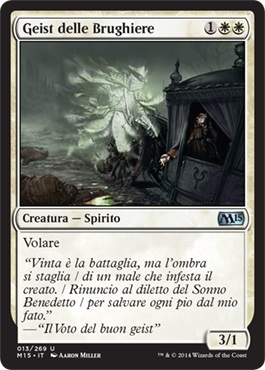A staggering amount of Magic content is published each day each day on a plethora of content sites, blogs, podcasts, and discussion forums. No matter how honest an effort you make, it's easy to fall behind and miss incredible articles because there just isn't enough time to read everything.
To that end, we've collected some of the best articles of the week covering a broad range of topics. If you're looking for articles, these are the ones you don't want to miss!
On Howard Lyon
Who is Howard Lyon? MJ asks this Magic artist seven questions so you can get to know him as more than just the artist of Rings of Brighthearth and other gems of Modern Magic. Join MJ as she gets the critical information like family, spirtuality, and favorite dipping sauce.
GatheringMagic.com: MJ Scott (@moxymtg)- 7 Questions: Howard Lyon
@moxymtg I knew I should have painted a little cup of dipping sauce at the bottom.
— Howard Lyon (@howardlyon) November 4, 2013
For all you RIngs of Brighthearth fans! Yummm! @howardlyon @RogueArtificer @travisdwoo pic.twitter.com/CT1AbtMY0E
— MJ Scott (@moxymtg) November 4, 2013
Lyon’s pieces stood out to me early on. First, it was because of their lush, palpable sensuality. Second, it was because of the memorable, unapologetic, in-the-moment women whom we are sometimes lucky enough to have populate his work. I’m suspicious that he may be living with a bevy of strong female models—his wife and daughters! There is a true tension between opposing forces in Lyon’s work, and that also appeals. I look at the dark corners of his stuff and think, “Yep, he’s been there.”
On Modern Decks
Where do inspired Modern decks come from? Jimi Brady explores a few of his most exiting ideas, and discusses the differences between developing and blending current ideas as compared to coming up with something completely different. Are you ready to brew up something fantastic for your next Modern event?
GatheringMagic.com: Jimi Brady (@JimiBrady) - Practical Deckbuilding in Modern
For many of us, deck-building involves a lot of head-scratching, and it usually happens like this:
It’s often the case in Magic that creative deck ideas end up being more gimmicky than revolutionary, and gimmicks don’t usually do well when paired against no-nonsense decks. So when creativity isn’t cutting it, but using an established deck sounds about as fun as . . . well, as using an established deck, where do you turn? I have a few options for you:
On #PTHOF
Is it time for the Hall of Fame to change? This week, Judge Emeritus Sheldon Menery uses his column to share his ballot and to discuss whether it's time to open up the Hall of Fame to non-players. Is there room for commentators, judges, scorekeepers, and more in the Hall? Who does Sheldon want to enshrine in Magic history? Read on and find out:
StarCityGames.com: Sheldon Menery (@SheldonMenery) - The Pro Tour Hall of Fame
On #MTGM15 Flavor
John Dale Beety had the privilege of being part of the flavor team that named the cards and provided the flavor text for Magic 2015. This week, John walks you through his thoughts about the flavor of one of the most exciting core sets in recent memory and provides some inside information on his own contributions.
StarCityGames.com: John Dale Beety (@jdbeety)- Magic 2015 Core Set Flavor Thoughts
Geist of the Moors - Cards with big empty text boxes are a luxury for flavor text writers, so when this card came up I went “home run or strikeout” and came up with a piece of... I guess you'd call it Innistrad folk verse. It definitely isn't anything that'd be chanted in Thraben Cathedral. While poetic meters and rhyme schemes are notoriously hard to translate, I've been impressed by the efforts made for the various Western European languages, like Italian:

On Hall of Fame Stats
What's wrong with the way we think about Hall of Fame stats? Florian Koch shares some of his thoughts on the metrics of Pro Tour Titles, Top 8's, and median performance. Are these reasonable metrics for determining who has put up Hall of Fame worthy performances? Are there better choices? Read on to find out.
ChannelFireball.com: Florian Koch - Fixing the Hall of Fame Stats
The Hall of Fame voting period has started, and as always this will spawn discussions about which players are good enough to warrant voting for them. At least in part, this comes down to the question of which players are best at this game, and going one step further, how to measure greatness at Magic. Being a bit of a statistics nerd, that is a question that has always interested me. After giving it some thought, I think that the metrics Wizards uses and gives us on their Hall of Fame website are suboptimal.
There are really only three metrics in use today: Top 8s, Pro Points, and Median. Top 8s are great, because they showcase the most valued achievement in the game, but obviously they are also a very discrete, imprecise measure. Pro Points are mostly a lifetime achievement which is also fine in that the Hall of Fame should be for players that have dedicated a significant part of their life to the Pro Tour, but it cannot distinguish between a grinder without much high level success and a hotshot that played only a few events.
Finally, there is median and I think this is actually one of the worst measures to take. The shortcomings of Top 8s and Pro Points as a metric are very obvious, thus everybody is aware of them and uses them accordingly. Median, however, is a pretender. It seems like it is a very precise and fair fair way of measuring Pro Tour performance. Unfortunately it measures something that we don’t really care about at all—the average. Let’s face it, in a game with as much variance as Magic most tournaments don’t go our way. That doesn’t mean they go awful, but most of the best players are not going to reach the goal they set for the tournament. This is a fact that everybody accepts, and so we don’t care for all the mediocre results that Guillaume Wafo-Tapa or Matej Zatlkaj have had over their career. Instead we focus on when they do well, and see that they Top 8'd or Top 16'd yet again. These are the results that count, and for them we are in awe of the prowess of the player. Nobody cares if that player wins a match more or less when they are having a bad day, but that is what is measured by the median.
On Chord
Chord of Calling has been a multi-format all star, and is returning to Standard with Magic 2015. What kind of unfair things can Chord of Calling do in this new format? Reid Duke is excited to find out; this week he's sharing a few of the ideas he's most excited about.
ChannelFireball.com: Reid Duke (@ReidDuke) - Fun with Chord of Calling
...We hardly need to delve into the past to see the power of searching up particular cards (also known as “tutoring”). Birthing Pod currently reigns as the most dominant deck in modern. Cards like Green Sun's Zenith, Natural Order, Infernal Tutor, Entomb, Intuition, Stoneforge Mystic, and Goblin Matron define Legacy. In Modern, it's Expedition Map, Sylvan Scrying, Scapeshift, Verdant Catacombs, Knight of the Reliquary, and yes, Chord of Calling, that make the format what it is.
At minimum, these four words printed on a Magic card deserve great respect. For me, they set off alarm bells and get my mind working in new and different ways. So when I see not one but two very intriguing tutor effects among M15's green cards, I can't help but imagine the possibilities.
On the Hall of Fame
Induction into the Pro Tour Hall of Fame is the highest honor there is for competitive Magic players. Joining the ranks of juggernauts like Jon Finkel and Kai Budde, Luis Scott-Vargas and Paulo Vitor Damo da Rosa; there is no greater reward for the years of dedication, competition, and community involvement. This week, the Pro Tour Historian breaks down the players who are eligible by the numbers. Their accomplishments, finishes, and Pro Points. Which players do you think will be the next to become part of Magic's legacy?
DailyMTG.com: Brian David-Marshall (@Top8games) - 2014 Hall of Fame Ballot Boxing
Dear Hall of Fame selection committee voter,
Here is your official ballot for the 2014 Magic Pro Tour Hall of Fame election.
That is the greeting to the ballots that were just sent out to the newly consolidated selection committee that is made up of commentators, tournament officials, key Wizards personnel, and all Magic players in good standing with more than 150 lifetime Pro Points. This year's ballot, which is the first to use the new threshold of 150 lifetime points to be eligible for induction, is considerably smaller than it was last season.
I am going to walk through the ballot year by year and give you a brief overview of the careers of these Hall of Fame–eligible players. I will start with players new to the ballot, meaning their Pro Tour careers began during the 2003–2004 season, and I will work backwards year by year to discuss players who remain on the ballot from previous seasons. If a player has appeared on fewer than 10% of the ballots for three years, the player removed from future ballots. Players can reactivate their eligibility by acquiring 4 Pro Points in the season leading up to a ballot.
If you have suggestions for next week's recap you can mention us on Twitter, or share throughout the week in the comments below.























